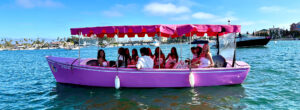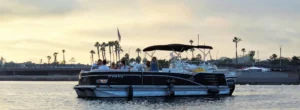Introduction
Eco-conscious boating is more than just a trend—it’s a necessary shift towards preserving our precious marine environments while enjoying the beauty and freedom that comes with being on the water. As recreational boating continues to grow in popularity, so does the impact it has on ecosystems, wildlife, and water quality. Boaters can play a crucial role in protecting these natural resources by adopting sustainable practices that minimize their environmental footprint.
Whether you’re a seasoned boater or new to the experience, there are simple yet effective ways to ensure that your time on the water is as green as possible. From choosing an eco-friendly vessel to managing waste responsibly, every decision you make can contribute to the health of our oceans, lakes, and rivers. In this guide, we’ll explore practical tips for eco-conscious boating, helping you to enjoy your day on the water while also safeguarding the environment.
Let’s dive into the various ways you can practice eco-conscious boating, ensuring that you leave nothing but a positive impact on the environment while making the most of your time on the water.
Choose an Eco-Friendly Boat
One of the most significant steps you can take towards eco-conscious boating is choosing the right vessel. Electric and hybrid boats are excellent options for reducing your carbon footprint, as they produce zero or low emissions compared to traditional fuel-powered boats. These boats run quietly, reducing noise pollution, which is beneficial for both marine life and other boaters.
Additionally, consider boats that utilize renewable energy sources, such as solar-powered or wind-powered vessels. These options harness natural energy, making them even more sustainable and reducing reliance on fossil fuels. While these boats may require a higher upfront investment, the long-term environmental and economic benefits make them a worthwhile choice.
If an electric or hybrid boat isn’t available, you can still make a difference by selecting a boat with a modern, fuel-efficient engine. Newer engines are designed to burn fuel more cleanly and efficiently, reducing emissions and improving overall fuel economy.
Proper Boat Maintenance
Regular maintenance is essential for keeping your boat in top condition and minimizing its environmental impact. A well-maintained boat operates more efficiently, uses less fuel, and is less likely to leak harmful substances into the water. Start by regularly inspecting your boat for leaks, particularly around the engine and fuel systems. Address any issues promptly to prevent pollutants from entering the water.
When cleaning your boat, opt for eco-friendly cleaning products that are biodegradable and free from harsh chemicals. Many conventional boat cleaners contain ingredients that can harm aquatic life and degrade water quality. By choosing green alternatives, you can keep your boat looking its best without compromising the environment.
Additionally, consider applying environmentally friendly bottom paints to your boat. These paints help prevent the growth of barnacles and algae without releasing toxic substances into the water. By keeping your boat clean and well-maintained, you contribute to a healthier marine ecosystem and ensure your boat’s longevity.
Fuel and Energy Efficiency
Optimizing fuel usage is a key aspect of eco-conscious boating. Start by planning your trips to minimize fuel consumption. Choose routes that are direct and avoid unnecessary idling, which wastes fuel and increases emissions. When navigating, maintain a steady speed that maximizes fuel efficiency—this is typically around 3,000 to 3,500 RPM for most boats.
Consider investing in fuel-efficient technologies, such as fuel flow meters, which can help you monitor and adjust your fuel usage in real-time. These devices provide valuable insights into how your boat consumes fuel, allowing you to make adjustments that reduce your overall fuel consumption.
Another way to reduce your environmental impact is by using renewable energy sources for your onboard systems. Solar panels, for example, can be installed on your boat to power electronics and charge batteries, reducing your reliance on fuel-powered generators. This not only cuts down on fuel usage but also provides a quieter, more peaceful boating experience.
Waste Management on the Water
Proper waste management is crucial for protecting marine environments from pollution. Start by implementing a strict “carry in, carry out” policy on your boat. This means that all trash, including food waste, plastic bottles, and other debris, should be taken back to shore for proper disposal or recycling. Avoid using single-use plastics whenever possible, as they are a major source of marine pollution.
Equip your boat with separate containers for recyclables, compostable items, and general waste to make sorting easier. Encourage all passengers to use these containers and educate them on the importance of keeping the water clean. Consider using reusable items, such as water bottles and utensils, to further reduce the amount of waste generated during your trip.
If your boat has a marine sanitation device (MSD), ensure it is properly maintained and used in compliance with local regulations. Never discharge untreated sewage into the water, as this can lead to pollution and harm aquatic life. Instead, use pump-out stations available at marinas or other designated areas to dispose of waste responsibly.
Respecting Marine Wildlife
When boating, it’s essential to respect the wildlife that inhabits the waters and surrounding environments. Always maintain a safe distance from marine animals, such as dolphins, whales, and seabirds. Approaching too closely can disturb their natural behaviors and cause stress. Adhere to local guidelines regarding wildlife viewing distances to ensure you’re not inadvertently harming these creatures.
Be mindful of your wake, especially when navigating near shorelines or shallow waters where marine life may be present. A large wake can disturb nesting sites, erode shorelines, and disrupt the habitats of fish and other aquatic organisms. Slow down when approaching these areas to minimize your impact.
Additionally, avoid feeding wildlife, as this can lead to dependency on human food and alter their natural behaviors. Keep an eye out for no-wake zones and wildlife protection areas, and respect any restrictions in place to help preserve these critical habitats.
Anchor Responsibly
Anchoring is an essential part of boating, but it must be done carefully to avoid damaging sensitive marine ecosystems, such as coral reefs, seagrass beds, and other underwater habitats. When choosing a spot to anchor, look for sandy or muddy bottoms that are less likely to be home to fragile marine life.
If you’re unsure of the seabed composition, consider using a mooring buoy if available. Mooring buoys are designed to provide secure anchorage without the need to drop an anchor, which can cause damage when dragged across the seabed. This is especially important in areas known for their biodiversity, such as coral reefs.
When anchoring, ensure that your anchor is properly set and that the chain is long enough to prevent the anchor from dragging. A dragging anchor can cause significant harm to underwater habitats and can also put your boat at risk of drifting. By anchoring responsibly, you help protect marine ecosystems while ensuring your boat remains safely in place.
Water Conservation
Water conservation is another important aspect of eco-conscious boating. While on the water, make an effort to minimize your use of fresh water, especially if you’re on a long trip. Simple steps like turning off the tap while brushing your teeth, taking shorter showers, and reusing water for multiple purposes can significantly reduce your water consumption.
When cleaning your boat, use a bucket instead of a hose to wash down surfaces. This conserves water and also reduces the runoff of cleaning products into the water. If possible, use biodegradable soaps and detergents that are designed to have minimal impact on the environment.
Additionally, be mindful of graywater discharge. Graywater, which comes from sinks, showers, and washing machines, can contain pollutants that harm aquatic life. Ensure that your boat’s graywater system is properly maintained and consider installing a graywater holding tank if one is not already present. By conserving water and managing graywater responsibly, you contribute to the overall health of marine environments.
Educating and Involving Passengers
Eco-conscious boating is a team effort, and educating your passengers about sustainable practices is key to ensuring a greener day on the water. Before setting out, take a few moments to explain the importance of protecting the environment and outline the steps everyone can take to minimize their impact. This might include using the proper waste disposal methods, conserving water, and respecting wildlife.
Involve your passengers in eco-friendly activities, such as picking up any litter you come across or participating in a shoreline cleanup. These activities not only help protect the environment but also raise awareness about the importance of preserving natural resources. They also provide an opportunity for everyone on board to connect with nature and appreciate the beauty of the marine environment.
Encouraging eco-conscious behavior on your boat sets a positive example and helps to instill a sense of responsibility in all passengers. By working together, you can ensure that your boating experience is both enjoyable and environmentally friendly.
Supporting Environmental Initiatives
In addition to practicing eco-conscious boating on the water, consider supporting broader environmental initiatives that promote marine conservation and sustainable boating practices. Many organizations work to protect marine environments, restore habitats, and educate the public about the importance of preserving our oceans, lakes, and rivers.
You can support these efforts by participating in local cleanup events, donating to marine conservation organizations, or volunteering your time to help with conservation projects. These actions contribute to the overall health of marine ecosystems and help ensure that future generations can enjoy boating in clean, vibrant waters.
Advocating for sustainable boating practices in your community is another way to make a positive impact. Share your knowledge with fellow boaters, encourage marinas to adopt green practices, and support policies that promote environmental stewardship. Together, these efforts help to create a culture of sustainability within the boating community.
Conclusion
Eco-conscious boating is about making thoughtful choices that reduce your environmental impact while enjoying the beauty and tranquility of the water. From selecting an eco-friendly boat to managing waste responsibly, every action you take contributes to the health and sustainability of marine ecosystems. By adopting these practices, you not only enhance your boating experience but also play a vital role in protecting the environment for future generations.
As you plan your next boating adventure, consider the tips outlined in this guide and strive to make each outing as green as possible. Whether you’re a seasoned boater or new to the water, these eco-conscious practices can help you enjoy a cleaner, more sustainable day on the water. Together, we can ensure that our waterways remain healthy and vibrant for years to come.
Excited for an adventure with us or have a question? Call us at: (949) 675-8433 Book Your Ride with us: Click here to Book


